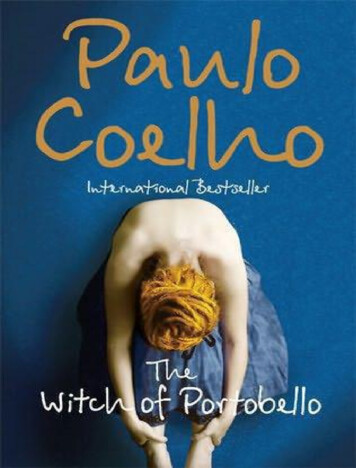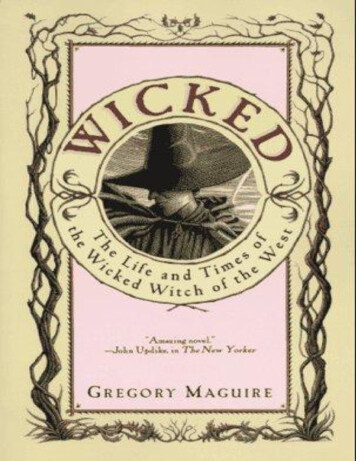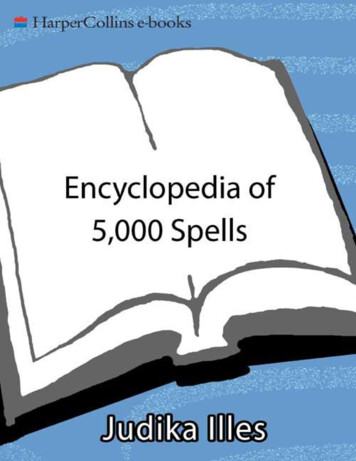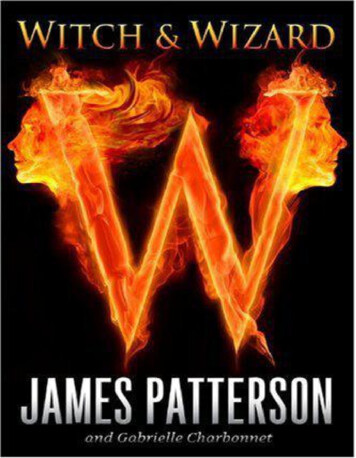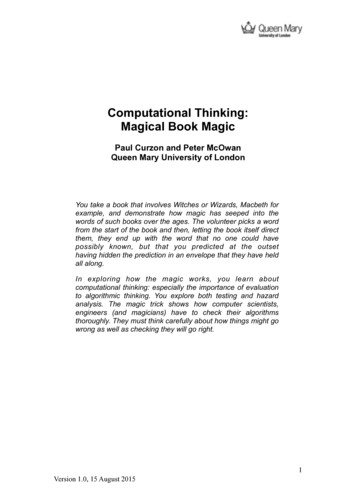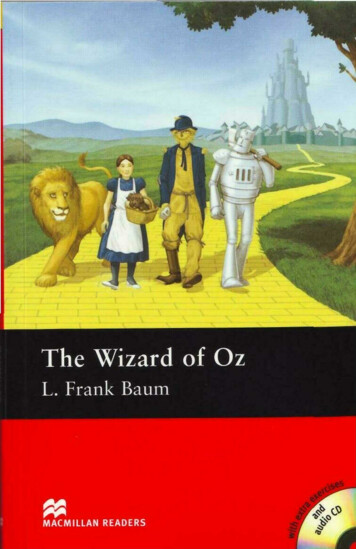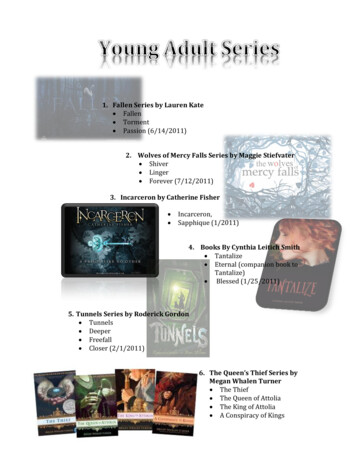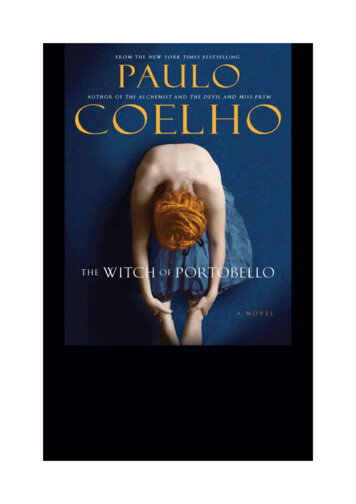
Transcription
THEWITCH OF PORTOBELLOA NovelPAULO COELHOTRANSLATEDFROM THE PORTUGUESEBY MARGARET JULL COSTA
FOR S.F.X.,a sun who spread light andwarmth wherever he went,and was an example to all thosewho think beyond their horizons
O Mary conceived without sin,pray for those who turn to you.Amen.No man, when he hath lighted a candle,putteth it in a secret place,neither under a bushel, but on a candlestick,that they which come in may see the light.—LUKE 11:33
ContentsEpigraphBegin ReadingAbout the AuthorOther Books by Paulo CoelhoCreditsCopyrightAbout the Publisher
Begin ReadingBefore these statements left my desk and followed the fate I eventually chose for them, Iconsidered using them as the basis for a traditional, painstakingly researched biography,recounting a true story. And so I read various biographies, thinking this would help me, only torealize that the biographer’s view of his subject inevitably influences the results of his research.Since it wasn’t my intention to impose my own opinions on the reader, but to set down the storyof “the Witch of Portobello” as seen by its main protagonists, I soon abandoned the idea ofwriting a straight biography and decided that the best approach would be simply to transcribewhat people had told me.
HERON RYAN, FORTY-FOUR, JOURNALISTNo one lights a lamp in order to hide it behind the door: the purpose of light is to create more light,to open people’s eyes, to reveal the marvels around.No one sacrifices the most important thing she possesses: love.No one places her dreams in the hands of those who might destroy them.No one, that is, but Athena.A long time after Athena’s death, her former teacher asked me to go with her to the town ofPrestonpans in Scotland. There, taking advantage of certain ancient feudal powers that were due tobe abolished the following month, the town had granted official pardons to eighty-one people—andtheir cats—who were executed in the sixteenth and seventeenth centuries for practicing witchcraft.According to the official spokeswoman for the Barons Courts of Prestoungrange &Dolphinstoun: “Most of those persons condemned were convicted on the basis of spectralevidence—that is to say, prosecuting witnesses declared that they felt the presence of evil spirits orheard spirit voices.”There’s no point now in going into all the excesses committed by the Inquisition, with itstorture chambers and its bonfires lit by hatred and vengeance; however, on our way to Prestonpans,Edda said several times that there was something about that gesture which she found unacceptable:the town and the Fourteenth Baron of Prestoungrange & Dolphinstoun were “granting pardons” topeople who had been brutally executed.“Here we are in the twenty-first century, and yet the descendants of the real criminals, thosewho killed the innocent victims, still feel they have the right to grant pardons. Do you know what Imean, Heron?”I did. A new witch hunt is starting to gain ground. This time the weapon isn’t the red-hot iron,but irony and repression. Anyone who happens to discover a gift and dares to speak of their abilitiesis usually regarded with distrust. Generally speaking, their husband, wife, father, or child, orwhoever, instead of feeling proud, forbids all mention of the matter, fearful of exposing their familyto ridicule.Before I met Athena, I thought all such gifts were a dishonest way of exploiting people’sdespair. My trip to Transylvania to make a documentary on vampires was also a way of provinghow easily people are deceived. Certain superstitions, however absurd they may seem, remain in thehuman imagination and are often used by unscrupulous people. When I visited Dracula’s castle,which has been reconstructed merely to give tourists the feeling that they’re in a special place, I wasapproached by a government official who implied that I would receive a “significant” (to use hisword) gift when the film was shown on the BBC. In the mind of that official, I was helping topropagate the myth and thus deserved a generous reward. One of the guides said that the number ofvisitors increased each year, and that any mention of the place would prove positive, even a programsaying that the castle was a fake, that Vlad Dracula was a historical figure who had nothing to dowith the myth, and that it was all merely a product of the wild imaginings of one Irishman [Editor’snote: Bram Stoker], who had never even visited the region.I knew then that, however rigorous I was with the facts, I was unwittingly collaborating withthe lie; even if the idea behind my script was to de-mythologize the place, people would believewhat they wanted to believe; the guide was right, I would simply be helping to generate morepublicity. I immediately abandoned the project, even though I’d already spent quite a lot of moneyon the trip and on my research.And yet my journey to Transylvania was to have a huge impact on my life, for I met Athenathere when she was trying to track down her mother. Destiny—mysterious, implacable Destiny—brought us face-to-face in the insignificant foyer of a still more insignificant hotel. I was witness toher first conversation with Deidre—or Edda, as she likes to be called. I watched, as if I were aspectator of my own life, as my heart struggled vainly not to allow itself to be seduced by a womanwho didn’t belong to my world. I applauded when reason lost the battle, and all I could do wassurrender and accept that I was in love.That love led me to see things I’d never imagined could exist—rituals, materializations,trances. Believing that I was blinded by love, I doubted everything, but doubt, far from paralyzingme, pushed me in the direction of oceans whose very existence I couldn’t admit. It was this same
energy which, in difficult times, helped me to confront the cynicism of journalist colleagues and towrite about Athena and her work. And since that love remains alive, the energy remains, eventhough Athena is dead, even though all I want now is to forget what I saw and learned. I could onlynavigate that world while hand in hand with Athena.These were her gardens, her rivers, her mountains. Now that she’s gone, I need everything toreturn as quickly as possible to how it used to be. I’m going to concentrate more on traffic problems,Britain’s foreign policy, on how we administer taxes. I want to go back to thinking that the world ofmagic is merely a clever trick, that people are superstitious, that anything science cannot explain hasno right to exist.When the meetings in Portobello started to get out of control, we had endless arguments abouthow she was behaving, although I’m glad now that she didn’t listen to me. If there is any possibleconsolation in the tragedy of losing someone we love very much, it’s the necessary hope thatperhaps it was for the best.I wake and fall asleep with that certainty; it’s best that Athena left when she did rather thandescend into the infernos of this world. She would never have regained her peace of mind after theevents that earned her the nickname “the Witch of Portobello.” The rest of her life would have beena bitter clash between her personal dreams and collective reality. Knowing her as I did, she wouldhave battled on to the end, wasting her energy and her joy on trying to prove something that no one,absolutely no one, was prepared to believe.Who knows, perhaps she sought death the way a shipwrecked victim seeks an island. She musthave stood late at night in many a Tube station, waiting for muggers who never came. She musthave walked through the most dangerous parts of London in search of a murderer who neverappeared or perhaps tried to provoke the anger of the physically strong, who refused to get angry.Until, finally, she managed to get herself brutally murdered. But, then, how many of us will besaved the pain of seeing the most important things in our lives disappearing from one moment to thenext? I don’t just mean people, but our ideas and dreams too: we might survive a day, a week, a fewyears, but we’re all condemned to lose. Our body remains alive, yet sooner or later our soul willreceive the mortal blow. The perfect crime—for we don’t know who murdered our joy, what theirmotives were, or where the guilty parties are to be found.Are they aware of what they’ve done, those nameless guilty parties? I doubt it, because theytoo—the depressed, the arrogant, the impotent, and the powerful—are the victims of the reality theycreated.They don’t understand and would be incapable of understanding Athena’s world. Yes, that’s thebest way to think of it—Athena’s world. I’m finally coming to accept that I was only a temporaryinhabitant, there as a favor, like someone who finds himself in a beautiful mansion, eating exquisitefood, aware that this is only a party, that the mansion belongs to someone else, that the food wasbought by someone else, and that the time will come when the lights will go out, the owners will goto bed, the servants will return to their quarters, the door will close, and we’ll be out in the streetagain, waiting for a taxi or a bus to restore us to the mediocrity of our everyday lives.I’m going back, or, rather, part of me is going back to that world where only what we can see,touch, and explain makes sense. I want to get back to the world of speeding tickets, people arguingwith bank cashiers, eternal complaints about the weather, to horror films, and Formula 1 racing.This is the universe I’ll have to live with for the rest of my days. I’ll get married, have children, andthe past will become a distant memory, which will, in the end, make me ask myself: How could Ihave been so blind? How could I have been so ingenuous?I also know that, at night, another part of me will remain wandering in space, in contact withthings as real as the pack of cigarettes and the glass of gin before me now. My soul will dance withAthena’s soul; I’ll be with her while I sleep; I’ll wake up sweating and go into the kitchen for aglass of water. I’ll understand that in order to combat ghosts you must use weapons that form nopart of reality. Then, following the advice of my grandmother, I’ll place an open pair of scissors onmy bedside table to snip off the end of the dream.The next day, I’ll look at the scissors with a touch of regret, but I must adapt to living in theworld again or risk going mad.
ANDREA MC CAIN, THIRTY-TWO, ACTRESS“No one can manipulate anyone else. In any relationship, both parties know what they’re doing,even if one of them complains later on that they were used.”That’s what Athena used to say, but she herself behaved quite differently, because she used andmanipulated me with no consideration for my feelings. And given that we’re talking about magichere, this makes the accusation an even more serious one; after all, she was my teacher, chargedwith passing on the sacred mysteries, with awakening the unknown force we all possess. When weventure into that unfamiliar sea, we trust blindly in those who guide us, believing that they knowmore than we do.Well, I can guarantee that they don’t. Not Athena, not Edda, nor any of the people I came toknow through them. She told me she was learning through teaching, and although, at first, I refusedto believe this, later I came to think that perhaps it was true. I realized it was one of her many waysof getting us to drop our guard and surrender to her charm.People who are on a spiritual quest don’t think, they simply want results. They want to feelpowerful and superior to the anonymous masses. They want to be special. Athena played with otherpeople’s feelings in a quite terrifying way.I understand that she once felt a profound admiration for St. Thérèse of Lisieux. I have nointerest in the Catholic faith, but from what I’ve heard, Thérèse experienced a kind of mystical andphysical union with God. Athena mentioned once that she would like to share a similar fate. Well, inthat case, she should have joined a convent and devoted her life to prayer or to the service of thepoor. That would have been much more useful to the world and far less dangerous than using musicand rituals to induce in people a kind of intoxicated state that brought them into contact with boththe best and the worst of themselves.I sought her out when I was looking for some meaning to my life, although I didn’t say asmuch at our first meeting. I should have realized from the start that Athena wasn’t very interested inthat; she wanted to live, dance, make love, travel, to gather people around her in order todemonstrate how wise she was, to show off her gifts, to provoke the neighbors, to make the most ofall that is profane in us—although she always tried to give a spiritual gloss to that search.Whenever we met, whether it was to perform some magical ceremony or just have a drink, Iwas conscious of her power. It was so strong I could almost touch it. Initially, I was fascinated andwanted to be like her. But one day, in a bar, she started talking about the “Third Rite,” which has todo with sexuality. She did this in the presence of my boyfriend. Her excuse was that she wasteaching me something. Her real objective, in my opinion, was to seduce the man I loved.And, of course, she succeeded.It isn’t good to speak ill of people who have passed from this life onto the astral plane.However, Athena won’t have to account to me, but to all those forces that she turned to her ownbenefit, rather than channeling them for the good of humanity and for her own spiritualenlightenment.The worst thing is that if it hadn’t been for her compulsive exhibitionism, everything we begantogether could have worked out really well. Had she behaved more discreetly, we would now befulfilling the mission with which we were entrusted. But she couldn’t control herself; she thoughtshe was the mistress of the truth, capable of overcoming all barriers merely by using her powers ofseduction.And the result? I was left alone. And I can’t leave the work half-finished—I’ll have to continueto the end, even though sometimes I feel very weak and often dispirited.I’m not surprised that her life ended as it did: she was always flirting with danger. They saythat extroverts are unhappier than introverts and have to compensate for this by constantly provingto themselves how happy and contented and at ease with life they are. In her case, at least, this isabsolutely true.Athena was conscious of her own charisma, and she made all those who loved her suffer.Including me.
DEIDRE O’NEILL, THIRTY-SEVEN, DOCTOR, KNOWN AS EDDAIf a man we don’t know phones us up today and talks a little, makes no suggestions, says nothingspecial, but nevertheless pays us the kind of attention we rarely receive, we’re quite capable ofgoing to bed with him that same night, feeling relatively in love. That’s what we women are like,and there’s nothing wrong with that—it’s the nature of the female to open herself to love easily.It was this same love that opened me up to my first encounter with the Mother when I wasnineteen. Athena was the same age the first time she went into a trance while dancing. But that’s theonly thing we had in common—the age of our initiation.In every other aspect, we were totally and profoundly different, especially in the way we dealtwith other people. As her teacher, I always did my best to help her in her inner search. As her friend—although I’m not sure my feelings of friendship were reciprocated—I tried to alert her to the factthat the world wasn’t ready for the kind of transformations she wanted to provoke. I rememberspending a few sleepless nights before deciding to allow her to act with total freedom and follow thedemands of her heart.Her greatest problem was that she was a woman of the twenty-second century living in thetwenty-first, and making no secret of the fact either. Did she pay a price? She certainly did. But shewould have paid a still higher price if she had repressed her true exuberant self. She would havebeen bitter and frustrated, always concerned about “what other people might think,” always saying“I’ll just sort these things out, then I’ll devote myself to my dream,” always complaining that “theconditions are never quite right.”Everyone’s looking for the perfect teacher, but although their teachings might be divine,teachers are all too human, and that’s something people find hard to accept. Don’t confuse theteacher with the lesson, the ritual with the ecstasy, the transmitter of the symbol with the symbolitself. The Tradition is linked to our encounter with the forces of life and not with the people whobring this about. But we are weak: we ask the Mother to send us guides, and all she sends are signsto the road we need to follow.Pity those who seek for shepherds, instead of longing for freedom! An encounter with thesuperior energy is open to anyone but remains far from those who shift responsibility onto others.Our time on this earth is sacred, and we should celebrate every moment.The importance of this has been completely forgotten: even religious holidays have beentransformed into opportunities to go to the beach or the park or skiing. There are no more rituals.Ordinary actions can no longer be transformed into manifestations of the sacred. We cook andcomplain that it’s a waste of time, when we should be pouring our love into making that food. Wework and believe it’s a divine curse, when we should be using our skills to bring pleasure and tospread the energy of the Mother.Athena brought to the surface the immensely rich world we all carry in our souls, withoutrealizing that people aren’t yet ready to accept their own powers.We women, when we’re searching for a meaning to our lives or for the path of knowledge,always identify with one of four classic archetypes.The Virgin (and I’m not speaking here of a sexual virgin) is the one whose search springs fromher complete independence, and everything she learns is the fruit of her ability to face challengesalone.The Martyr finds her way to self-knowledge through pain, surrender, and suffering.The Saint finds her true reason for living in unconditional love and in her ability to givewithout asking anything in return.Finally, the Witch justifies her existence by going in search of complete and limitless pleasure.Normally a woman has to choose from one of these traditional feminine archetypes, but Athenawas all four at once.Obviously we can justify her behavior, alleging that all those who enter a state of trance orecstasy lose contact with reality. That’s not true: the physical world and the spiritual world are thesame thing. We can see the Divine in each speck of dust, but that doesn’t stop us from wiping itaway with a wet sponge. The Divine doesn’t disappear; it’s transformed into the clean surface.
Athena should have been more careful. When I reflect upon the life and death of my pupil, itseems to me that I had better change the way I behave too.
LELLA ZAINAB, SIXTY-FOUR, NUMEROLOGISTAthena? What an interesting name! Let’s see her Maximum number is nine. Optimistic, sociable,likely to be noticed in a crowd. People might go to her in search of understanding, compassion,generosity, and for precisely that reason, she should be careful, because that tendency to popularitycould go to her head and she’ll end up losing more than she gains. She should also watch hertongue, because she tends to speak more than common sense dictates.As for her Minimum number eleven, I sense that she longs for some leadership position. Shehas an interest in mystical subjects and through these tries to bring harmony to those around her.However, this is in direct conflict with the number nine, which is the sum of the day, month,and year of her birth reduced to a single figure: she’ll always be subject to envy, sadness,introversion, and impulsive decisions. She must be careful not to let herself be affected by negativevibrations: excessive ambition, intolerance, abuse of power, extravagance.Because of that conflict, I suggest she take up some career that doesn’t involve emotionalcontact with people, like computing or engineering.Oh, she’s dead? I’m sorry. So what did she do?What did Athena do? She did a little of everything, but if I had to summarize her life, I’d say: shewas a priestess who understood the forces of nature. Or, rather, she was someone who, by the simplefact of having little to lose or to hope for in life, took greater risks than other people and ended upbeing transformed into the forces she thought she mastered.She was a supermarket checkout girl, a bank employee, a property dealer, and in each of thesepositions she always revealed the priestess within. I lived with her for eight years, and I owed herthis: to recover her memory, her identity.The most difficult thing in collecting together these statements was persuading people to let meuse their real names. Some said they didn’t want to be involved in this kind of story, others tried toconceal their opinions and feelings. I explained that my real intention was to help all those involvedto understand her better, and that no reader would believe in anonymous statements.They finally agreed because they all believed that they knew the unique and definitive versionof any event, however insignificant. During the recordings, I saw that things are never absolute,they depend on each individual’s perceptions. And the best way to know who we are is often to findout how others see us.This doesn’t mean that we should do what others expect us to do, but it helps us to understandourselves better. I owed it to Athena to recover her story, to write her myth.
SAMIRA R. KHALIL, FIFTY-SEVEN, HOUSEWIFE, ATHENA’S MOTHERPlease, don’t call her Athena. Her real name is Sherine. Sherine Khalil, our much-loved, muchwanted daughter, whom both my husband and I wish we had engendered.Life, however, had other plans—when fate is very generous with us, there is always a well intowhich all our dreams can tumble.We lived in Beirut in the days when everyone considered it the most beautiful city in theMiddle East. My husband was a successful industrialist, we married for love, we traveled to Europeevery year, we had friends, we were invited to all the important social events, and once, thepresident of the United States himself visited my house. Imagine that! Three unforgettable days,during two of which the American Secret Service scoured every corner of our house (they’d been inthe area for more than a month already, taking up strategic positions, renting apartments, disguisingthemselves as beggars or young lovers). And for one day, or rather, two hours, we partied. I’ll neverforget the look of envy in our friends’ eyes, and the excitement of having our photo taken alongsidethe most powerful man on the planet.We had it all, apart from the one thing we wanted most—a child. And so we had nothing.We tried everything: we made vows and promises, went to places where miracles wereguaranteed, we consulted doctors, witch doctors, took remedies and drank elixirs and magic potions.I had artificial insemination twice and lost the baby both times. On the second occasion, I also lostmy left ovary, and after that, no doctor was prepared to risk such a venture again.That was when one of the many friends who knew of our plight suggested the one possiblesolution: adoption. He said he had contacts in Romania, and that the process wouldn’t take long.A month later, we got on a plane. Our friend had important business dealings with the dictatorwho ruled the country at the time, and whose name I now forget [Editor’s note: Nicolae Ceausescu],and so we managed to avoid the bureaucratic red tape and went straight to an adoption center inSibiu, in Transylvania. There we were greeted with coffee, cigarettes, mineral water, and with thepaperwork signed and sealed. All we had to do was choose a child.They took us to a very cold nursery, and I couldn’t imagine how they could leave those poorchildren in such a place. My first instinct was to adopt them all and carry them off to Lebanon,where there was sun and freedom, but obviously that was a crazy idea. We walked up and downbetween the cots, listening to the children crying, terrified by the magnitude of the decision we wereabout to make.For more than an hour, neither I nor my husband spoke a word. We went out, drank coffee,smoked, and then went back in again—and this happened several times. I noticed that the woman incharge of adoptions was growing impatient; she wanted an immediate decision. At that moment,following an instinct I would dare to describe as maternal—as if I’d found a child who should havebeen mine in this incarnation, but who had come into the world in another woman’s womb—Ipointed to one particular baby girl.The woman advised us to think again. And she’d been so impatient for us to make a decision!But I was sure.Nevertheless—trying not to hurt my feelings (she thought we had contacts in the upperechelons of the Romanian government)—she whispered to me, so that my husband wouldn’t hear:“I know it won’t work out. She’s the daughter of a gypsy.”I retorted that culture isn’t something that’s transmitted through the genes. The child, who wasbarely three months old, would be our daughter, brought up according to our customs. She would goto our church, visit our beaches, read books in French, study at the American School in Beirut.Besides, I knew nothing about gypsy culture—and I still know nothing. I only know that they travela lot, don’t wash very often, aren’t to be trusted, and wear earrings. Legend has it that they kidnapchildren and carry them off in their caravans, but here, exactly the opposite was happening: they hadleft a child behind for me to take care of.The woman tried again to dissuade me, but I was already signing the papers and asking myhusband to do the same. On the flight back to Beirut, the world seemed different: God had given mea reason for living, working, and fighting in this vale of tears. We now had a child to justify all ourefforts.
Sherine grew in wisdom and beauty—I expect all parents say that, but I really do think she wasan exceptional child. One afternoon, when she was five, one of my brothers said that if, in thefuture, she wanted to work abroad, her name would always betray her origins, and he suggestedchanging it to one that gave nothing away, like Athena, for example. Now, of course, I know thatAthena refers not only to the capital of Greece, but that it is also the name of the Greek goddess ofwisdom, intelligence, and war.Perhaps my brother knew not only that but was aware too of the problems an Arab name mightbring in the future, for he was very involved in politics, as were all our family, and wanted to protecthis niece from the black clouds that he, and only he, could see on the horizon. Most surprising of allwas that Sherine liked the sound of the word. That same afternoon, she began referring to herself asAthena and no one could persuade her to do otherwise. To please her, we adopted the nickname too,thinking that it would be a passing fancy.Can a name affect a person’s life? Time passed, and the name stuck.From very early on, we discovered that she had a strong religious vocation—she spent all hertime in the church and knew the Gospels by heart; this was at once a blessing and a curse. In aworld that was starting to be divided more and more along religious lines, I feared for my daughter’ssafety. It was then that Sherine began telling us, as if it were the most natural thing in the world, thatshe had a series of invisible friends—angels and saints whose images she was accustomed to seeingin the church we attended. All children everywhere have visions, but they usually forget about themafter a certain age. They also treat inanimate objects, such as dolls or fluffy tigers, as if they werereal. However, I really did feel she was going too far when I picked her up from school one day, andshe told me that she’d seen “a woman dressed in white, like the Virgin Mary.”Naturally, I believe in angels. I even believe that the angels speak to little children, but when achild starts seeing visions of grown-ups, that’s another matter. I’ve read about various shepherds andcountry people who claimed to have seen a woman in white, and how this eventually destroyed theirlives, because others sought them out, expecting miracles; then the priests took over, their villagebecame a center of pilgrimage, and the poor children ended their lives in a convent or a monastery. Iwas, therefore, very concerned about this story. Sherine was at an age when she should have beenmore concerned with makeup kits, painting her nails, watching soppy TV soaps and children’sprograms. There was something wrong with my daughter, and I consulted an expert.“Relax,” he said.According to this pediatrician specializing in child psychology—and according to most otherdoctors in the field—invisible friends are a projection of a child’s dreams and a safe way of helpingthe child to discover her desires and express her feelings.“Yes, but a vision of a woman in white?”He replied that perhaps Sherine didn’t understand our way of seeing or explaining the world.He suggested that we should gradually begin preparing the ground to tell her that she was adopted.In the pediatrician’s words, the worst thing that could happen would be for her to find out byherself. Then she would begin to doubt everyone, and her behavior might become unpredictable.From then on, we changed the way we talked to her. I don’t know how much childrenremember of what happens to them, but we started trying to show her just how much we loved herand that there was no need for her to take refuge in an imaginary world. She needed to see that hervisible universe was as beautiful as it could possibly be, that her parents would protect her from anydanger, that Beirut was a lovely city and its beaches full of sun and people. Without ever mentioning“the woman in white,” I began spending more time with my daughter; I in
the witch of portobello a novel paulo coelho
